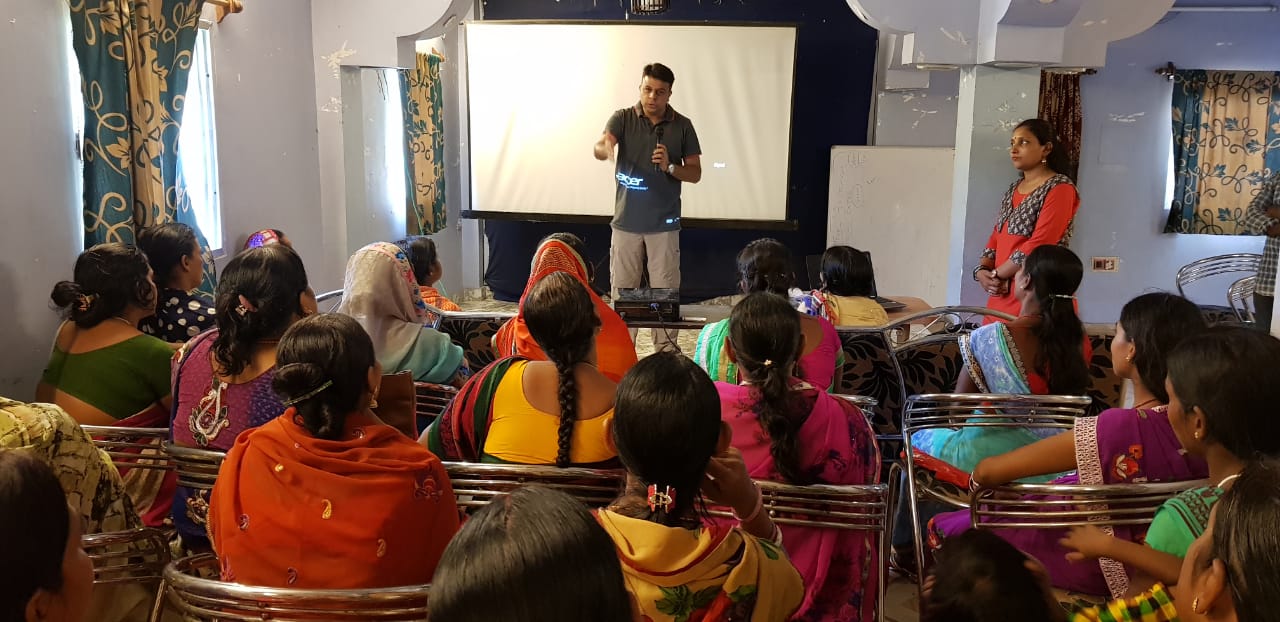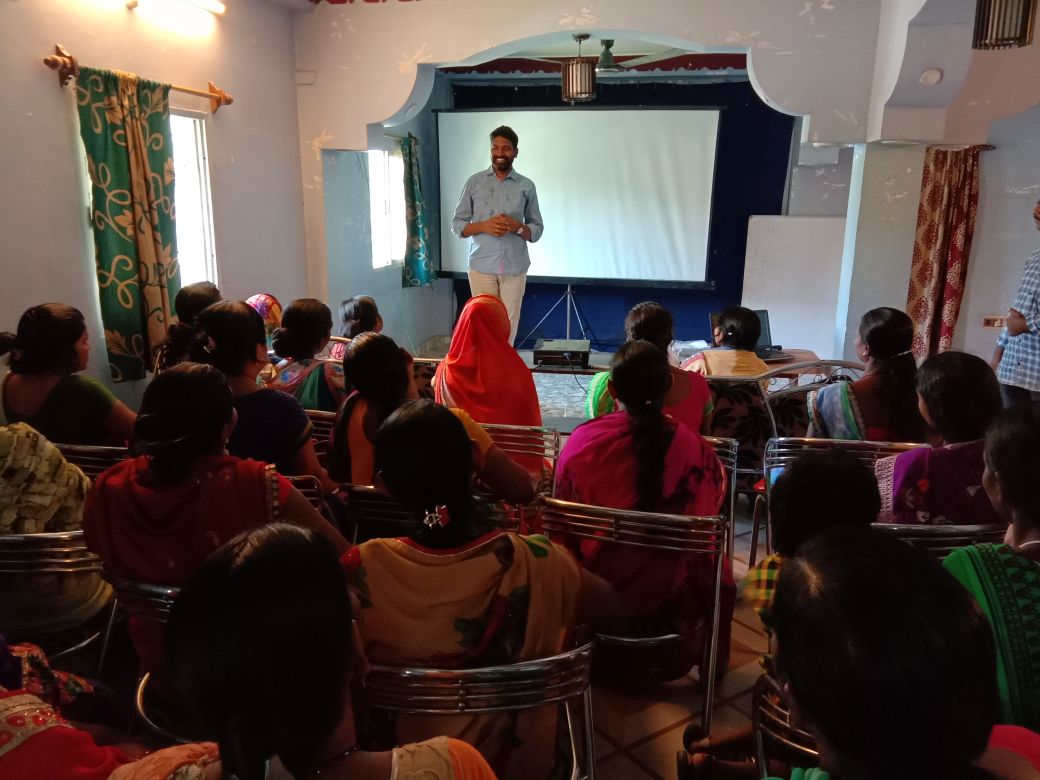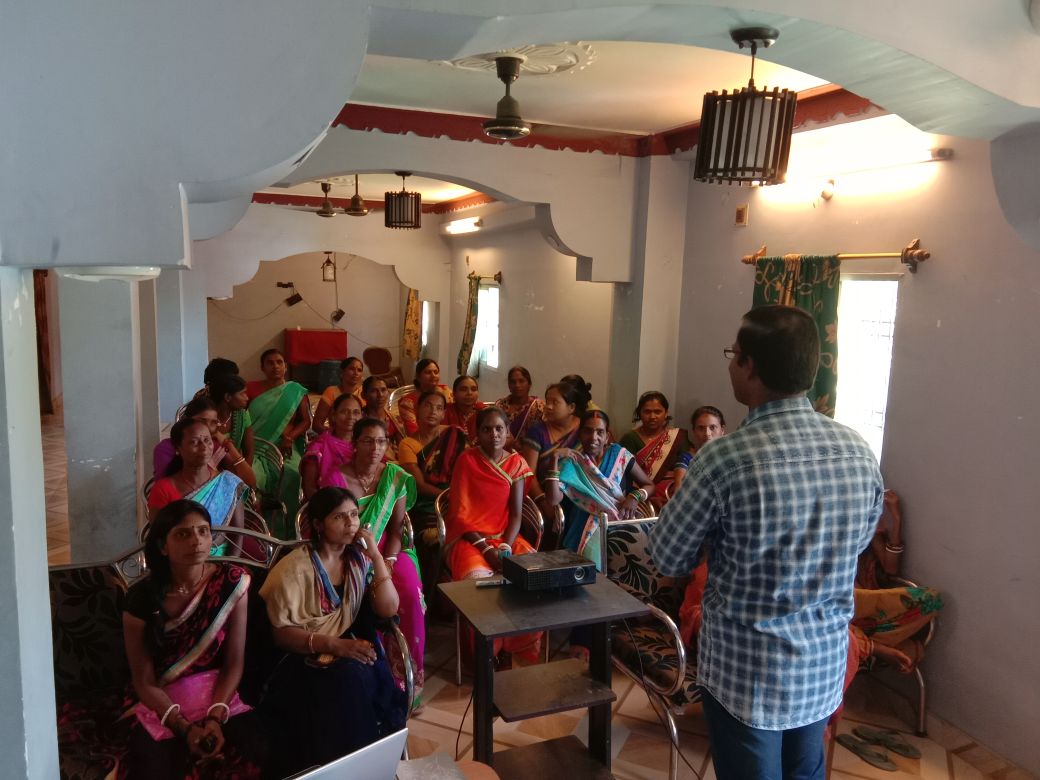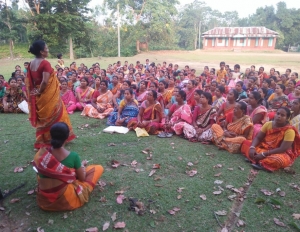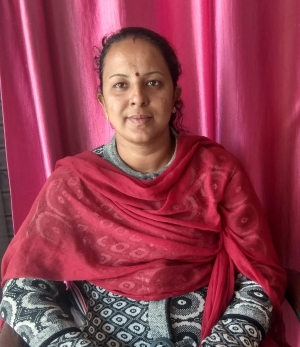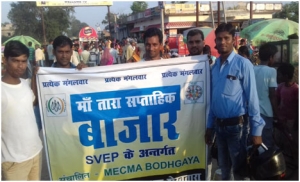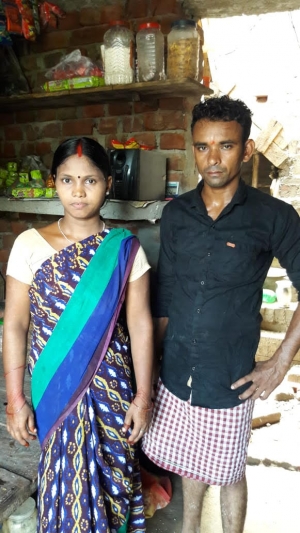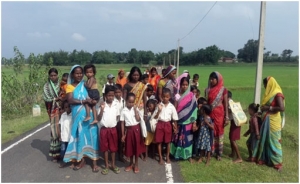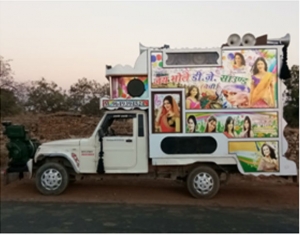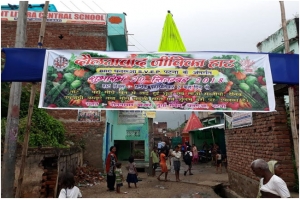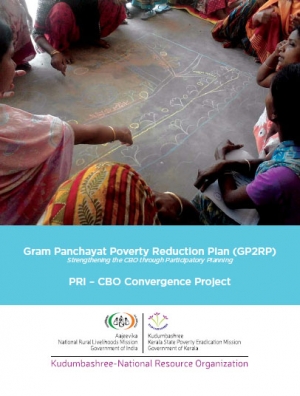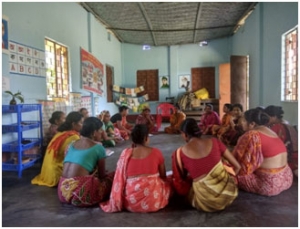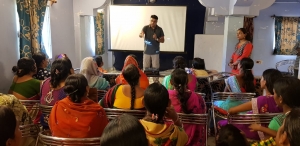Kudumbashree NRO
Scope of women collectives in making their dreams come true
Kudumbashree NRO has been using various process oriented tools in partner states with the objective of making women from the community network realize the importance of their participation in the development agenda of their Panchayat. Gram Panchayat Poverty Reduction Plan (GP2RP) is one such tool through which the SHG federations prepare consolidated demands in four different areas namely entitlement plan, livelihood plan, individual infrastructure plan and public goods and services plan. The consolidated plan, which represents the demands from the community, is later submitted to the Panchayat. The idea is to complement Panchayat’s work which is also responsible for making Gram Panchayat Development Plans (GPDP), containing various components for addressing the vulnerabilities of poor, marginalized.
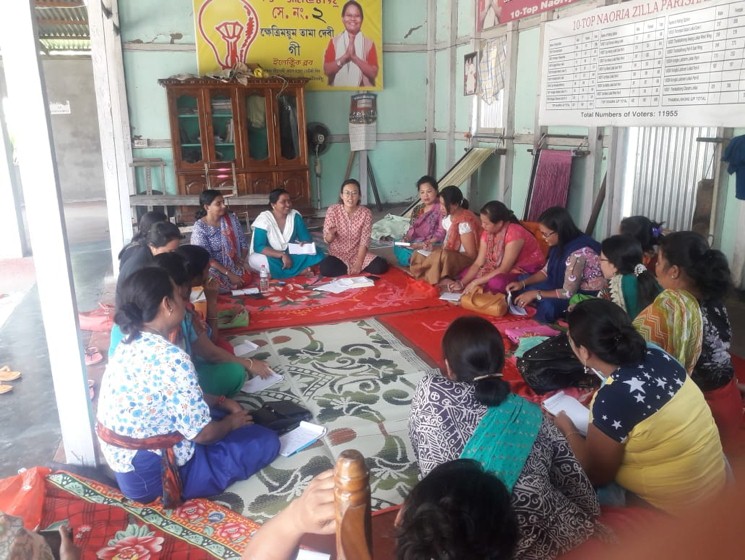
The Ministries of Panchayati Raj and Rural Development recently issued separate directives to the departments of Panchayati Raj and Rural Development citing the importance of Self Help Groups (SHG) in the preparation of GPDP. It advised to ensure the integration of SHG demand plan in the GPDPs. In this context, Kudumbashree NRO facilitated the preparation of Gram Panchayat Poverty Reduction Plans (GP2RP) in its partner State Rural Livelihood Missions (SRLMs). SHGs convened special meetings to collect the demands of each of the members and consolidate at the Gram Panchayat level. They use the tools of PRA, dream mapping and other participative tools to visualise on the plans. The consolidated plans were then presented in Gram Sabhas for approval. To make these Gram Sabha meetings a huge success, SHG women conducted mobilization rallies, campaigns and other activities.The preparation of these plans gave a legitimate role for the SHGs to be active participants in preparation of the local plans of their Gram Panchayats.
In Assam, Kudumbashree NRO facilitated the preparation of a total of 87 GP2RP plans which was then submitted to the Gram Panchayats for the integrating with the GPDP. Similarly, 50 Gram Panchayats/Village Councils in Tripura and 12 Gram Panchayats in Manipur also prepared plans and submitted. In UP, a total of 73 poverty reduction (out of 100) plans have been prepared and submitted to the respective Gram Panchayats.
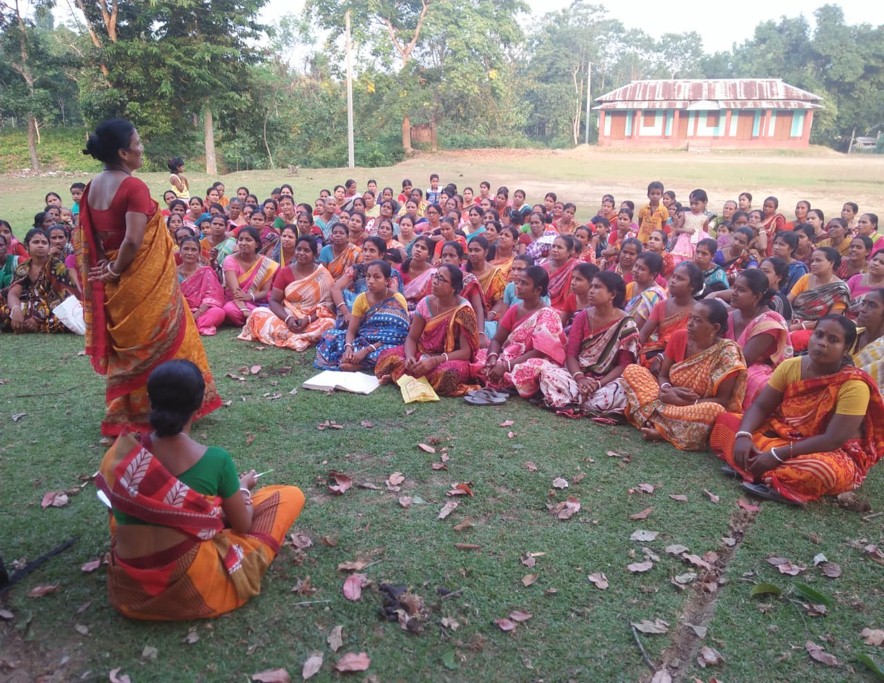
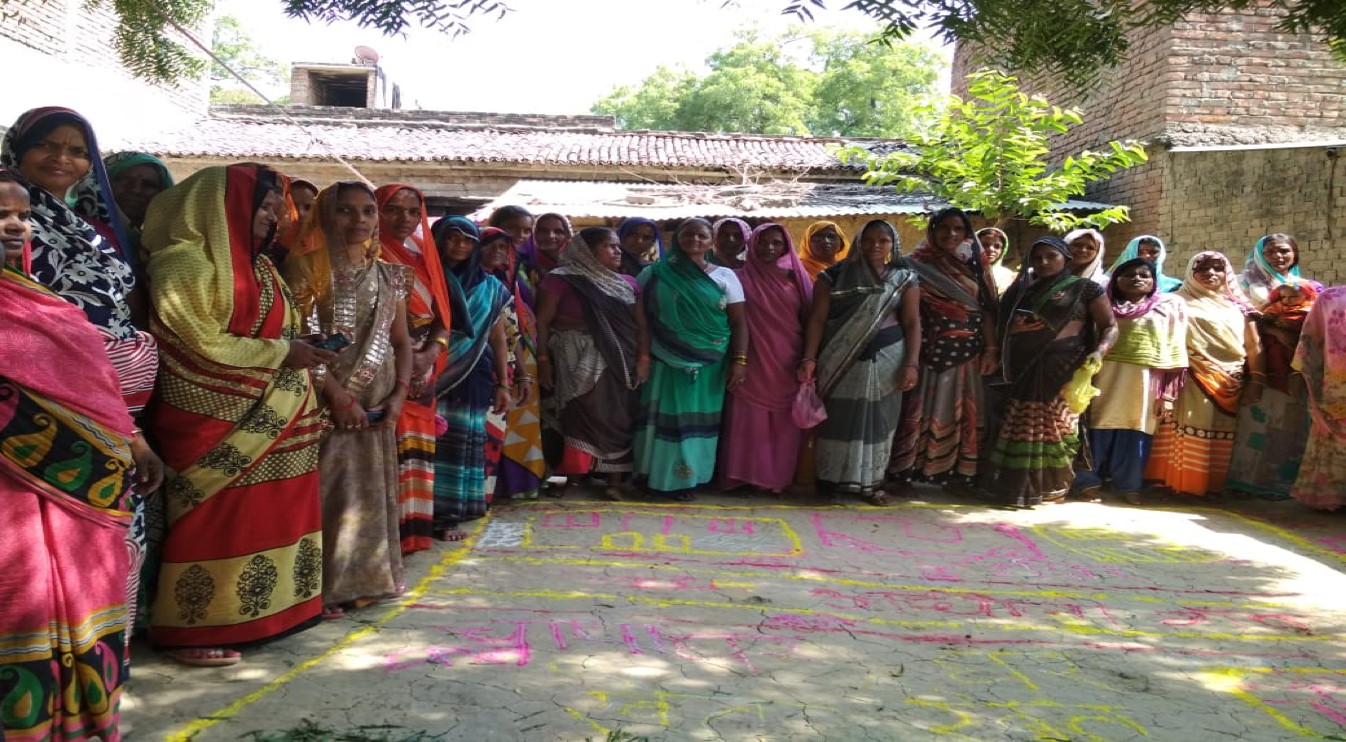
Now these women collectives are looking forward to the implementation of these plans through its integration with GPDP. The experience of preparation of the Poverty reduction was shared by Kudumbashree NRO in the regional workshops on GPDP organised by Ministry of Panchayati Raj at Hyderabad, Shimla and Guwahati.
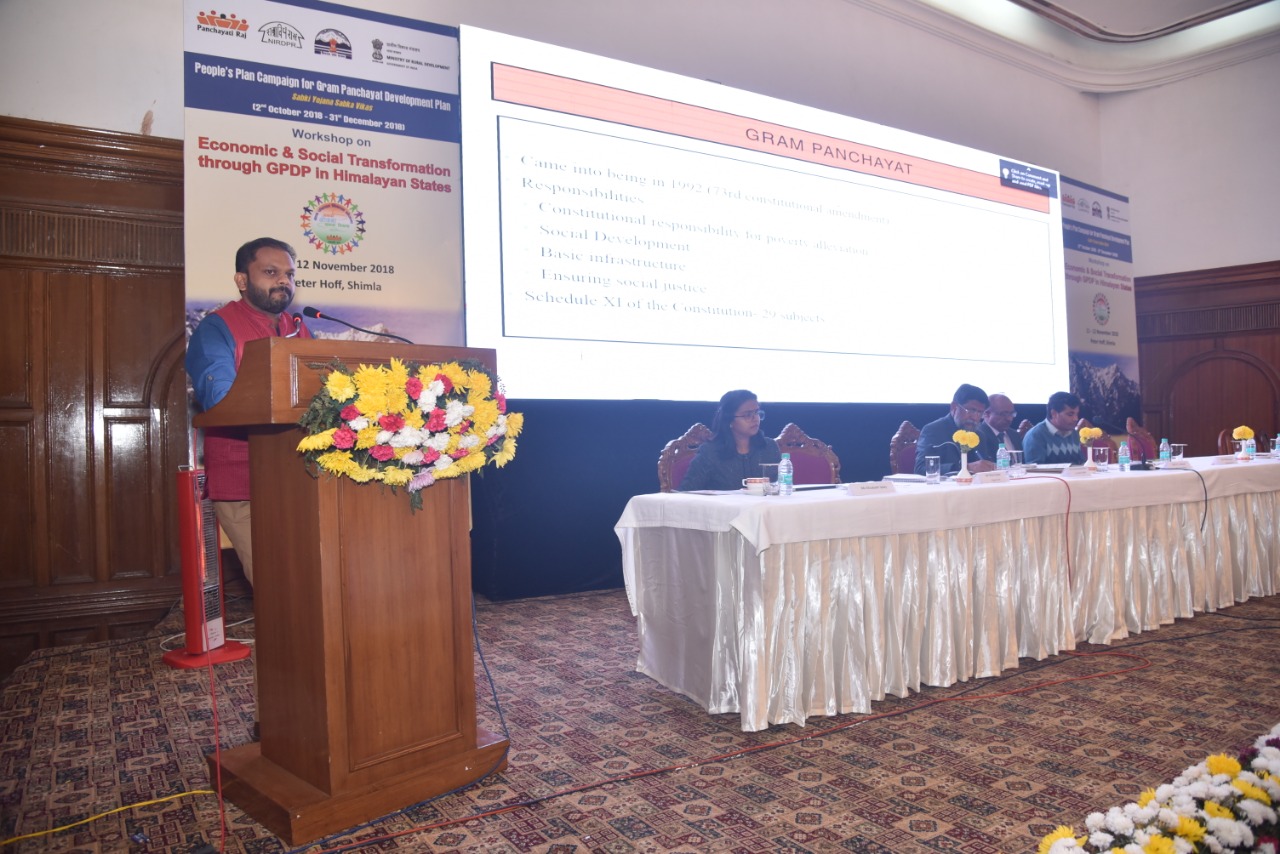
Community's strength is my strength - Asha Rajendran
Asha Rajendran began her association with Kudumbashree in the year 2006 with the formation of a Neighbourhood Group (NHG) along with fifteen women from her village. She was made the secretary of the group and in this way Asha embarked upon her journey as a community leader. The group soon began with an income generating activity and with the help of a bank linkage loan of Rs. 50,000 started a ready-made cloth shop and tailoring business. As an individual she was quite driven and with other members of her group was involved in many developmental activities in her village. Once, the group took steps to clean and reconstruct an old 2-km-long road in their village. As an ADS member (Area Development Society- federation at the ward level) she helped many poor people access entitlements, facilitated the cleaning of local water bodies through chlorination, conducted health camps and other health awareness programs in her village.
In the year 2009, Ms Sreekala, the Micro Enterprise Consultant (MEC) working in the Panchayat informed Asha about the opportunity to work as an MEC. Asha consulted people from the District Mission and the Village Extension Officer of her Panchayat who suggested that the opportunity was good but was also informed about the rigorous training program that she will have to go through. With the support from her husband Asha decided to apply for the job.
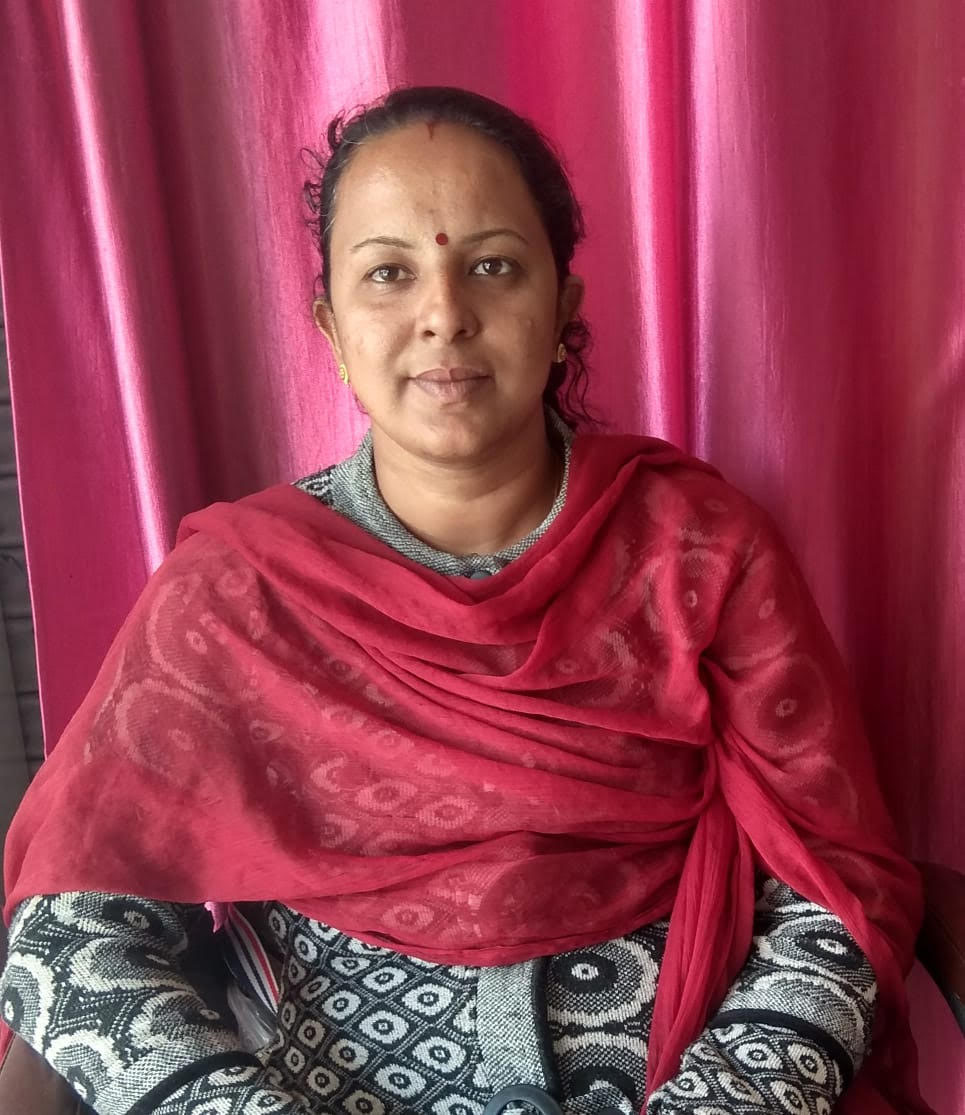
Asha Rajendran
She cleared the tests and got the job. Although the training program that she had to go through was grueling, it was one of the most fulfilling experiences of her life. As an MEC she handled two Panchayats. In the year 2012, she formed her own MEC group along with few other members and handled 26 Panchayats. She was the secretary of the group and got opportunities to provide different trainings to entrepreneurs and motivated them to start enterprises. She also helped in organizing a program for promoting enterprise development initiatives among tribals called ‘Unarv’ under which she provided General Orientation Training programs, soft skills trainings and helped six tribal women in getting engaged with the Adu gramam Samagra project of Kudumbashree. As an MEC, she supported over 500 women for earning their livelihoods under the Kudumbashree ME development scheme.
Later, she was also selected to work as a mentor under the MEC project of Kudumbashree NRO and as part of it; she was posted in Osmanabad (Maharashtra). Her responsibility was to guide MECs, (local community cadre trained in supporting enterprise promotion), selected by Maharashtra State Rural Livelihood Mission (Umed). There, she supported 47 MECs in their capacity building process and implementation of ME-development at field level. Under her guidance, the MECs gave handholding support to more than 5000 enterprises in the district. Initial days of her journey in Maharashtra was challenging as the community members only spoke Marathi. Asha knew only Malayalam and in a short period of time learning Hindi and Marathi was challenging. Slowly she picked up the language which also helped her gain support of the community. In Osmanabad, she supported MECs to identify business opportunities, business plan preparation, organized weekly markets and festival markets. From her previous experience of Kudumbashree, she helped in organising goat market in villages of Osmanabad. The market helped in reducing the commission of middlemen in buying and selling of goats and increased the confidence of the entrepreneurs.
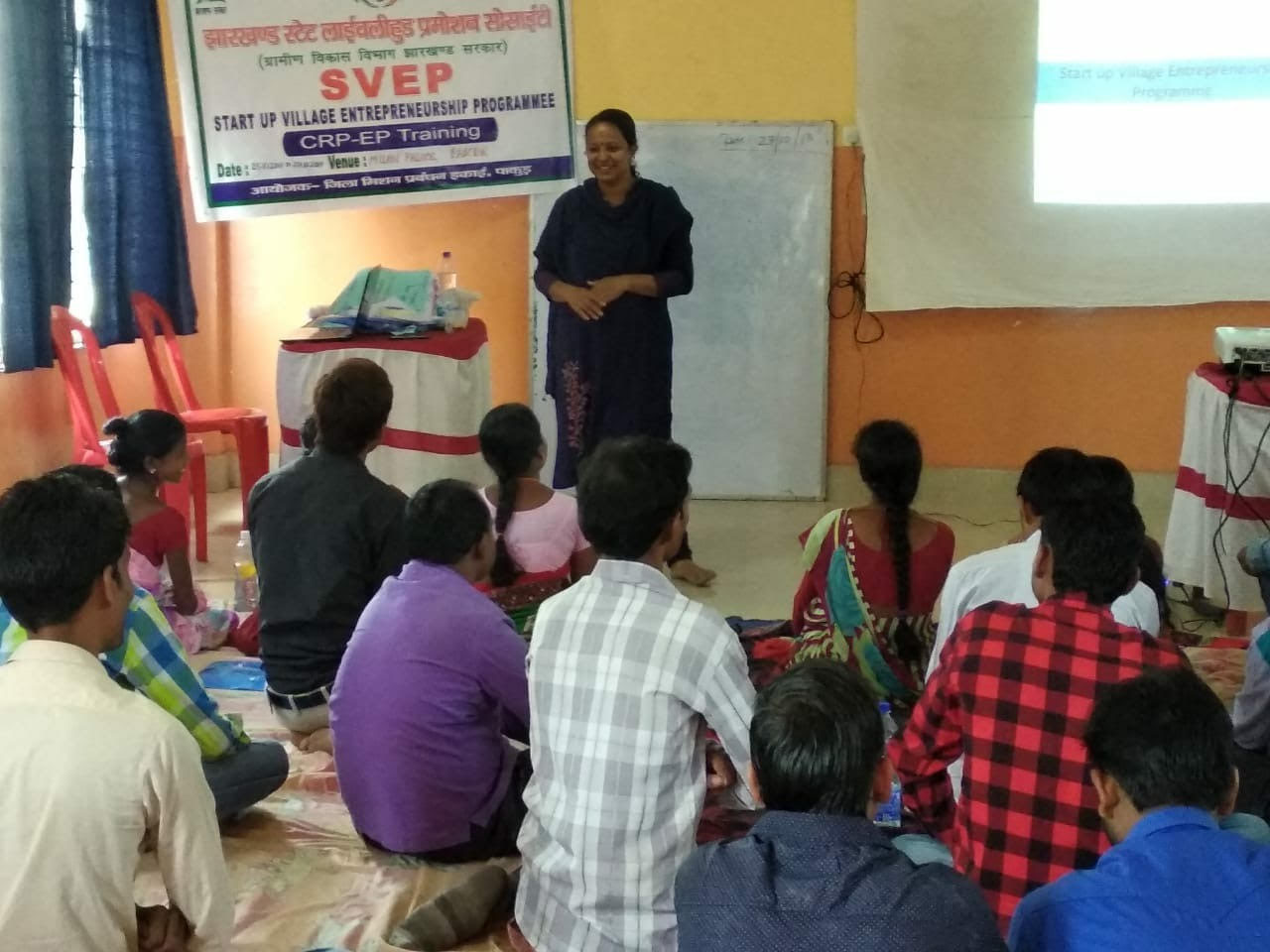
Asha Rajendran training CRPs-EP in Jharkhand
She motivated SHG women and MEC cadre to reopen a local market which was shut down years back. Around 75 entrepreneurs participated in the market and in the first week itself the sales was more than Rs. 1,16,000. As part of other initiatives, she encouraged five MECs to complete their graduation. Five of the MECs who worked under her were selected as Master Trainers. As Master Trainers their responsibility was to provide training programs for MECs from other partner states. She also helped in developing a brand called AADYA for all SHG products in the district. In her three years’ mentor experience in Maharashtra, Asha spent her time to learn about innovative projects like the by-products of soyabean, making rangoli colors, lemon syrup, etc.Currently she is working in remote villages of Palamu district, Jharkhand as a mentor. She shares that her focus is to improve the livelihood of SHG women from marginalized communities, widows, illiterates etc. There are at least 50 women whom she knows from the district having excellent skills in preparing various value added products from bamboo, waste paper & clothes. She would like to mobilize these women, give them skill training programs and recognition for their work. This will also create larger employment opportunities for the community.
Her commitment towards the community was recently acknowledged when she was short listed for C. Subramaniam Award for community development and social change for the year 2018-19 by National Foundation of India. Asha will soon be travelling to Delhi for the final round of open discussion where she will be sharing her experience of working with the grassroots.
“I am a passionate social worker working for community development since the last 8 years. I am speaking on behalf of all
the community leaders who have been working in the field like me but have never been recognized or appreciated at any platform.
We have been working with selfless motives but have never got the opportunity to showcase our talents and skills to the outer world.
I hope our efforts get recognized so that more women are encouraged to come in the forefront and become an influencing force to the community.
– Asha Rajendran
Weekly Haat: Initiative from MECMA (CRPEP) group of Bodhgaya
MECMA-Micro Enterprise Consultancy and Marketing Agency, the CRP-EP group from Bodhgaya, has been a passionate group of five men working to support entrepreneurs from the community in setting up and running their business. Members of the group -Sanjeet Kumar, Sunil Kumar, Anuj Kumar, Anirudha Kumar and Suman Kumar, have together helped in setting up more than 50 Micro-Enterprises in Bodhgaya. When they realized that people of the Shekhwara Panchayat had to travel miles for buying vegetables and basic household items, they decided to set up a weekly haat that could help people in fulfilling their daily consumption needs. The idea was discussed with the Block Enterprise Promotion Committee (BEPC) members and Block Project Manager (BPM) SVEP of Bodhgaya district.
As the members of the BEPC were well aware of the persistent issue of the villages, discussions with these members was very helpful and it was decided to set up a haat in the Panchayat. Vijayarani, the mentor from Kudumbashree NRO who had prior experience in setting up sustainable markets, guided the group in executing the idea. The group carried out a background study of the village and found out that there is a possibility of getting around 100 entrepreneurs for the Haat from the Panchayat itself. When they actually went to mobilize entrepreneurs, they were surprised to get more than 125 of them. The market was inaugurated on 13th October, 2018 by BEPC members and District Project Manager. More than 600 people visited the market. It had entrepreneurs who had started their enterprises under SVEP as well as entrepreneurs from within and outside the Panchayat. The market featured products like vegetables, spices, meat & fishe, bamboo products, food products, clothes, jewellery & other fancy items. The overall sales for the market amounted to Rs. 56,468. Looking at the success of the market, it has been decided by the Panchayat to continue it every Tuesday.
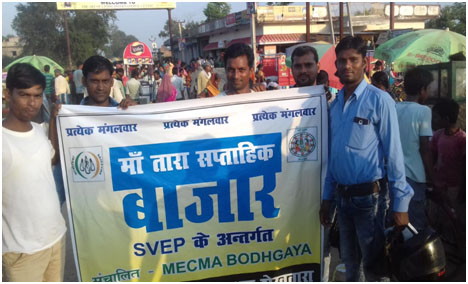
Members of MECMA group with the Banner
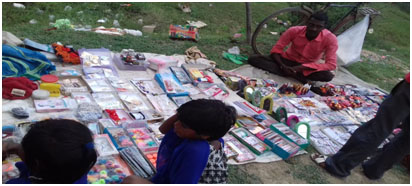
Entrepreneurs selling fancy items
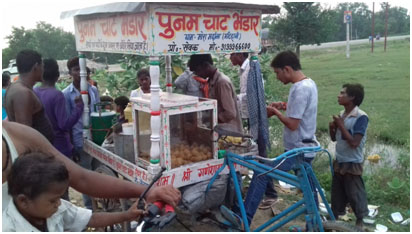
Food items being sold in the market
The story of Rani Devi and her determination to succeed
Basic Profile of the entrepreneur
|
Name |
Rani Devi (28) |
|
Village |
Rajnagar Rara |
|
Gram Panchayat |
Moriamma |
|
Block |
Dhanarua |
|
District |
Patna |
|
State |
Bihar |
|
SHG |
Gulab Jeevika SHG |
|
VO |
Vaishnavi VO |
|
CLF |
Adarsh CLF |
|
Family |
Rajniti Sav (Husband) Two sons and one daughter |
|
Education |
9th class |
Rani Devi, the Community Resource Person for Enterprise Promotion (CRP-EP) under Start-up Village Entrepreneurship Programme (SVEP) from Dhanarua Block of Patna has an inspiring story of growth to share. Being born into absolute poverty, she had to be content with single meal a day and only a pair of dress. She was married off at the tender age of 14 and was forced to stop her education. The family faced a number of financial difficulties. Their house had only a room to accommodate the six members, that too without a toilet facility. Her husband sold cold drinks in local trains but whatever money he earned, was spent on drinking. Her mother-in-law worked as a daily wage labourer but got only fistful of rice at the end of a days’ work which was not enough for the family.
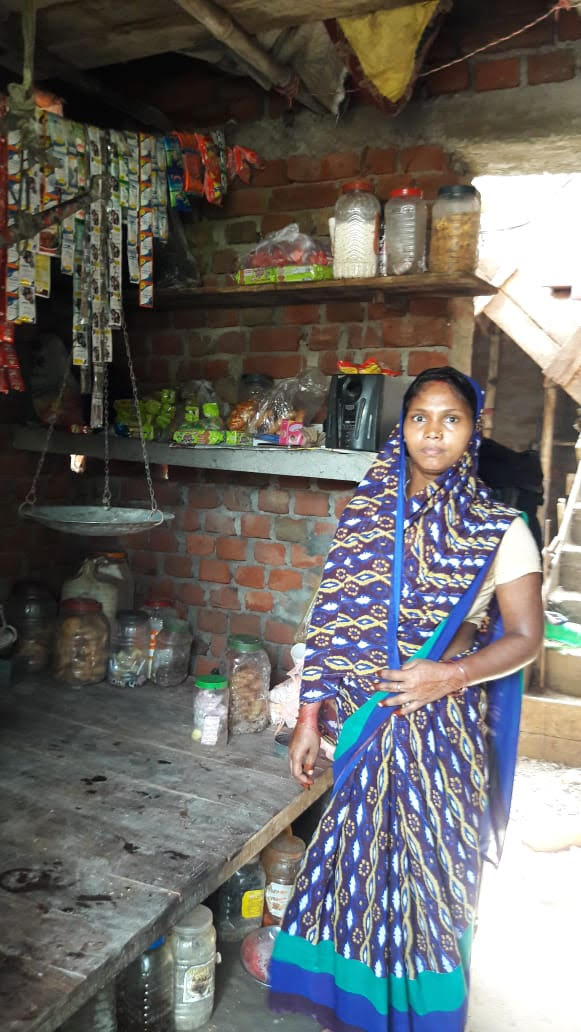
Rani Devi at her shop
In 2015, Rani Devi joined in Jeevika SHG, soon after the birth of her second son. She couldn’t even pay the weekly savings of Rs. 10 to attend the meetings in those times. Howevers she still managed to be part of the SHG network. In 2016, she came to know that applications were being invited to work in SVEP Project under Jeevika. She wanted to apply for the job but her husband and his family vehemently refused to support her saying that they will not eat from her salary. However she applied for the post without informing them. She attended the CRP-EP selection at Dhanarua Block after lying to her husband that she is going to buy medicines for her children. She got selected as CRP-EP at the end of the selection process. The initial trainings were planned in Patna, around 90 kms from her home, but her husband was reluctant to send her for the same. Jeevika Cluster Manager, Ratna Devi intervened and convinced Ravi Devi’s husband to let her be part of the training. Later when residential trainings were conducted in Dhanarua, her husband again refused to allow her to be part of the trainings. Kudumbashree NRO mentor then intervened and convinced her husband by saying “Rani Devi can earn a lot of money by working as CRP EP under SVEP project, and help the family to come out of poverty. Rani Devi is capable of doing this work; she had cleared the tough examination and successfully completed the previous trainings”.
Rajniti agreed on one condition, that she will have to come back home every day after training. She used to get up early, 5 am in the morning, complete the household chores and attended the trainings till 6 pm. It was her determination that helped her overcome these challenges.
Rani Devi remembers an incident when her husband came drunk at the training centre and created an unpleasant scene. He quarreled with her in front of everyone including her colleagues and staff members from Jeevika saying that he did not understand what was going on in the training program and so cannot let his wife continue there. Looking at the situation, NRO mentors made him sit in the training hall and watch the training proceedings. This convinced him and gradually Rani Devi completed all the trainings to become a CRP-EP. Meanwhile, towards the end of the training, she had started a small bangle shop attached to her home with the training she got and the subsistence allowance she received as part of it. She bought bangles from the whole sale market near her town Masauri and sold it to neighbors and villagers near her home.
She applied for a loan of Rs. 5,000 from her VO, but got rejected at first citing reason that she will not be able to repay. Once again the Jeevika Cluster Manager Ratna Devi intervened and convinced V.O. Office bearers to give her loan on her guarantee. With the loan amount she bought seasonal vegetables and cereals from villagers to her shop at whole sale rate and sold it to customers in retail. The shop was situated in a place where no other shops were around. The businesses were quiet successful and so she handed it over (bangles and vegetables along with general store) to Rajniti’s younger brother and focused her efforts to Micro Enterprise development activities in the block under SVEP. As CRP-EP she currently makes Rs. 5,000 per month on an average. She even helped her husband from the experience she acquired from the CRP EP trainings and field work, in improving his business which increased his earnings from Rs. 100 per day to Rs. 500-600 per day.
Rani Devi’s mother-in-law has now stopped working as wage laborer and provides full support to Rani Devi in her ventures. Rani Devi will soon be shifting her house from single room accommodation to 3 BHK Pucca house with toilet facility, by October 2018.
Future plans
Rani Devi plans to start a textile shop with readymade clothes along with a stitching centre in her village. She says it was her father’s wish for her to continue his textile shop business after his demise. She wants her husband to stop selling cool drinks in local trains and join the textile business in future. She also wants her children to get well educated by joining good schools in town.
“I used to be at home all my life until I joined Jeevika and SVEP. Now people in my village recognize me, respect me, within and outside my family”.
Towards social change…….
The convergence project focuses on bringing together Panchayats and women from the community network under one platform. It is based on the premise that a democratically conscious community will help in strengthening and sustaining local government institutions. The project is being implemented in Jharkhand since 2015 and has brought about substantial changes in the functioning of the Panchayat and CBO network over the years.
Ranga Panchayat in Masalia Block of Dumka district (Jharkhand) is a tribal belt with an approximate population of 4500. The tribals belong to Santhal community and farming is one of the main source of their livelihood. The men are engaged in farming, fishing and other types of labour work whereas women are engaged in household activities like preparing food, fetching water etc. The Panchayat has basic infrastructure like school, hospital, roads etc. The Panchayat has 64 (Sixty four) SHGs and 7 (Seven) VOs with most of the women regularly attending the meetings and doing savings. As a socially conscious community, women have also been discussing issues affecting them and taking actions to address them. The project has motivated women to work for the overall well being and have also become more aware of their rights as well as citizenship.
Under the project, LRGs have formed Bal Samuhs and at present Ranga Panchayat has around 44 Bal Samuhs. Children have been doing activities like discussions, quiz, cultural programs etc. LRG’s, the community cadre have been guiding the children during these meetings.
However there were some situations that had to be addressed, especially the situation of local schools. Children never attended classes regularly and were always untidy. Parents of the children who went to school never bothered about the overall well being of their children. The authorities/teachers were also not concerned about the functioning of the school as most of the time students will be wandering outside playing and doing nothing. Under the guidance of the mentors and support of LRGs, women from the SHG federation took up the issue seriously. SHG women discussed about their children’s education in their weekly meetings. One of the VOs, Ranga Ajeevika Mahila Gram Sangathan decided that they will take care of their children and pay attention to their education along with regular follow up with school authorities. As part of it, SHG women have been attending School Management Committees (SMC) and even questioned the authorities making them more accountable. It has brought about a positive change in the existing situation as now the school authorities have been acting responsibly. The women visit the school once in a week and enquire about the children’s performance. Looking at the responsibility taken by the VO even other VOs from the Panchayat have been taking up the issue of attending to their children’s education seriously.
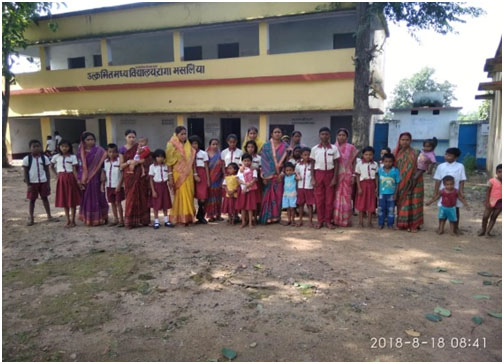
Women attending School Management Committee Meeting
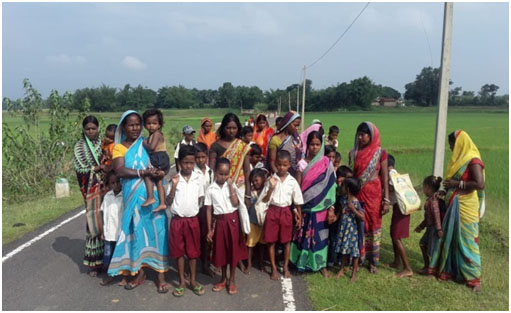
Women taking their children to school
Balaji Tent House- A Village Entrepreneurship Success Story
Birulal Mali, an entrepreneur from Begun Block, Chittorgarh (Rajasthan) has been one of the most successful entrepreneurs under SVEP. He is also the only person who has received more than Rs. 50,000 as CEF loan in Begun. Birulal used to work for a shop engaged in providing light and sound services for events in the village. He earned a meagre income of Rs. 4000 a month working under him. Despite devoting years of dedicated service, his employer was reluctant to increase his pay. With constantly failing crops in his farm managed by his father, Birulal was forced to look for a new job. It was then that his wife informed him about SVEP which she came to know through the Micro Enterprise Consultant (MEC) Durga Rao who worked in Chechi village. Birulal sensed an opportunity and was confident that he can become the most successful DJ and Tent House service provider in the region with the right inputs for his business. He assisted Durga in preparing a business plan for his idea and took Enterprise Development Training from Begun Block Resource Centre. He requested a Rs. 1 Lakh loan which is the maximum amount that can be provided under SVEP. When the BRC management committee was convinced that his business was viable, they approved his CEF loan application. His application for a loan was initially rejected by the bank after which he had approached BRC.
Being an investment intensive business, he also pooled in some money given by his father and took another loan from the BRC to invest in his business. With an initial investment of Rs. 178,000 he started his business in Chechi from a small shop. His commitment towards his work made the business a major success and gave tough competition to others in the business including his previous employer. His business grew at a rapid pace within a short span of 1.5 years, and today as an entrepreneur he owns assets worth Rs. 13 lakhs. Durga Rao, the MEC from his village provided adequate handholding support during the initial stages and according to him Birulal was quick to learn business and financial management skills that he initially lacked. Unable to withstand competition, his previous employer shifted his shop to different location. Today Birulal runs his shop in the same space from where his previous employer operated. According to him, this is his sweet revenge. He has been accumulating enough savings and investing back to the business, one of the major reasons for the growth of his business.
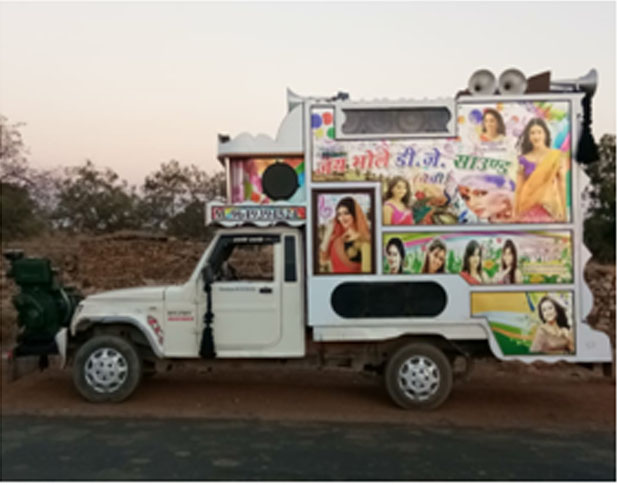
Birulal's mobile DJ sound system
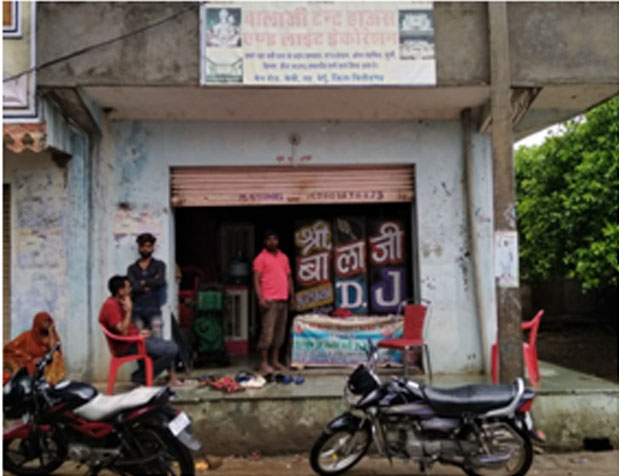
Birulal in front of his shop
His dream is to acquire a large tent house which can be rented out to host large gatherings and stage programmes. Even though it would cost him around 10-12 lakhs, he is confident of fulfilling his dream and take his business to the next level.
Inauguration of weekly haat under SVEP in Dhanarua, Bihar
Rural Haats have great potential in providing the entrepreneur a regular customer base and an opportunity to earn additional income. They are usually organized once in a week or a month at a place equally accessible by entrepreneurs and people from nearby villages. It connects the entrepreneur to an organized facility where they have access to space, customers and is a cost effective alternative for selling their produce/goods. From the customer point of view, it addresses the accessibility and mobility issue that people from villages often face. A weekly market was organized in Dolabad village of Nimda Gram Panchayat in Dhanarua block in Patna under the Start-up Village Entrepreneurship Program (SVEP). It was inaugurated on 20th September 2018 by the members of Block Resource Centre (BRC) of Dhanarua Block and treasurer from Adarsh CLF in the presence of representatives from Gram Panchayat, Jeevika and mentors from Kudumbashree NRO.
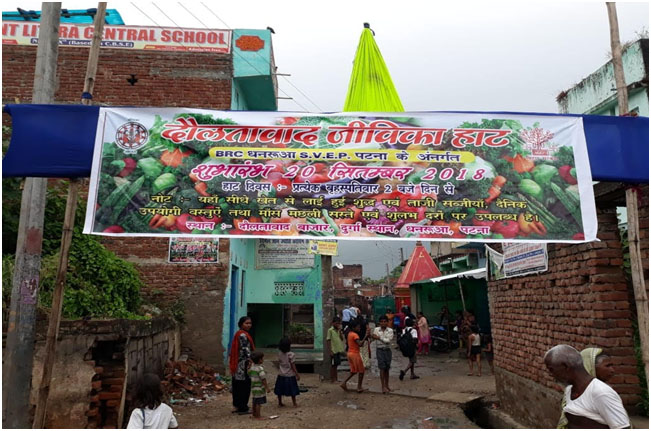
The entrance of the market

Inauguration of the weekly haat
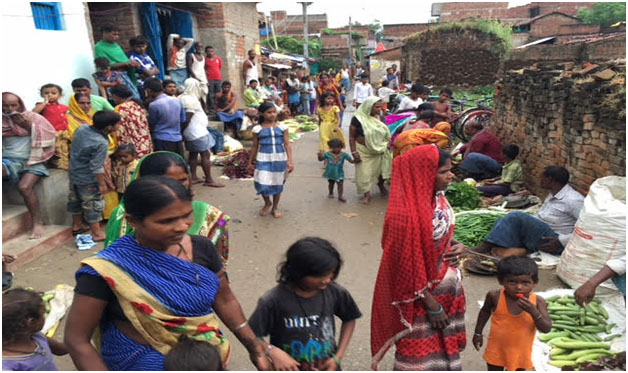
Entrepreneurs and customers in the market
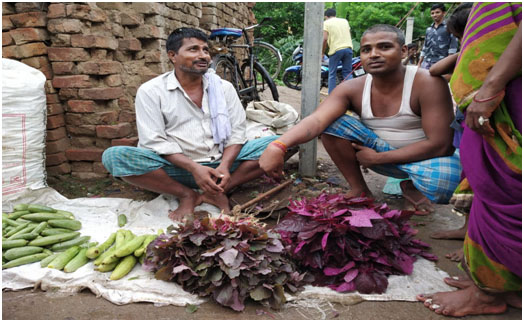
Entrepreneurs selling their produce
The need for a weekly market was realised as people from Dolabad village had to travel more than 8 kms to purchase items for their daily consumption. The village only had around 6 to 7 shops located in different parts and was clearly inadequate to cater the needs of locals. BRC members and CRP-EPs came up with the idea of weekly market which was developed in consultation with the mentors from Kudumbashree NRO and Block Project Manager (SVEP). CRP-EPs were instrumental in selecting the venue and mobilization of entrepreneurs for the market. The Panchayat President who has been supportive of the initiative, arranged the venue for the market free of cost. More than 24 entrepreneurs participated in the weekly market, among them, majority were vegetable vendors (14) and other type of sellers like clothing (2), fish (2), fancy (4) and pani puri stalls (2). Inspite of heavy rains during the day of the event, the market functioned and recorded total sales of Rs. 32,400. The market will function every Thursday and is expected to expand with more entrepreneurs participating in the market who will cater the needs of more than 3500 families residing in 14 nearby villages. The market will be closely monitored by CRP-EPs with the support of Block Project Manager (SVEP) and mentors from Kudumbashree NRO which will include mobilization of more entrepreneurs, maintaining records of sales and tracking footfall for the weekly market.
Gram Panchayat Poverty Reduction Plan
A Push towards Change
AamraKorbo Joy VO (Village Organisation) of Paschim Khilpara GP (Gram Panchayat) in Matabari Block was formed on November 2016. The members from the VO mostly belong to the minority community and the GP is also a minority dominated. Even though the VO was formed long back, it hardly functioned. The group had its fair share of problems, mainly because it belonged to the minority community. The women were not allowed to go out of their homes and many of them were financially dependent on their husbands. Moreover illiteracy and lack of awareness were some of the issues that discouraged them to work for themselves and their community.
However, few months back the women from the group realized that something had to be done and they cannot sit without doing anything. They decided to take few steps immediately. One of them was to replace the office bearers and give the charge to someone who was willing to work for the cause of the women. Celina Begum, who was one of the most active LRGs was made the president. Things started getting better soon after that. She made sure that there is proper representation of all the SHGs in the VO and are functioning well. The members also noticed that women from other GPs were beneficiaries of various schemes, but none of the women from their VO were beneficiaries of any schemes.
Seeing this, the VO decided to ask the Panchayat to organize a special Gram Sabha. Mobilization for the same was done by the VO itself. The Gram Sabha was attended by a huge number of women and the event also made it to the local headlines on that day. Since then, the VO has been tirelessly working to fulfill the demands of the SHGs and is taking steps accordingly. Many women have started coming out of their homes and feel fearless of leaving their purdah behind.
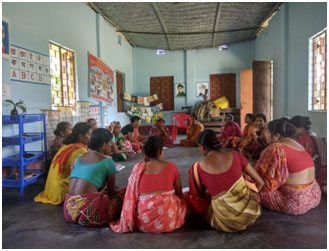
AmraKorbo Joy VO
Almost all of them have been regularly attending Gram Sabhas and have seen Panchayat office and anganwadis, something that they were not really aware about. The VO was even labeled as a representation of the Communist Party and was also threatened. But the women were unfazed by such accusations and have been attending the meetings regularly. They are now seen as a very strong group. The VO recognizes the fact that in very short period they have been able to do a lot and are now confident of working harder for the betterment of their community. A lot of the credit goes to the four LRGs who have been working in the Panchayat. They are well informed, educated and are concerned for the well-being of the women. They have encouraged these women to be fearless and have been successful in doing so. The VO members also give the credit to the Mentors from Kudumbashree NRO. The Mentors have inspired these women to stand up for their rights.
“We asked only for those didis to be a part of the VO who wanted to work. Work, tirelessly. We simply said- those who don`t want to work, they can sit at their homes comfortably.”
Kudumbashree NRO to partner with States for setting up Foodservice enterprises
With more than 25000 enterprises supported across different states, Kudumbashree NRO has proved its ability to nurture entrepreneurship among rural and first generation entrepreneurs. It has also demonstrated the feasibility of promoting a range of enterprises that have the ability to scale-up, in terms of operations, employment opportunities and income generation. In this context, Kudumbashree NRO has now been chosen as the National Resource Centre (NRC) for the promotion of scalable enterprise models across states. As a National Resource Centre, the institution will work in creating resource pools for Foodservice enterprises (Canteens, Catering Units, Small restaurants, Pushcarts, food take away and Fast food corners) which will support the implementation of the project in partner states.
Among first of its initiatives, Kudumbashree NRO will be supporting Jeevika, the State Rural Livelihood Mission of Bihar, for starting an institutional canteen in one of the District hospitals in Vaishali. The project is also being supported by World Bank. A training program in association with AIFHRM is being conducted for entrepreneurs who will be running the hospital canteen. Around 30 SHG women are currently undergoing training for equipping them with skills of running a foodservice enterprise, which began on 11th September, 2018.
